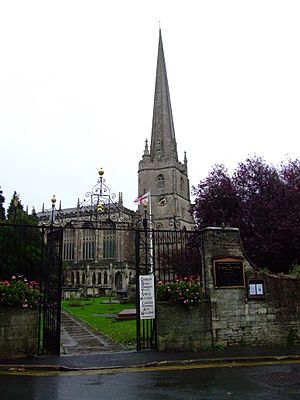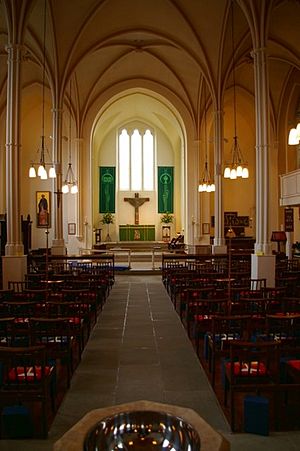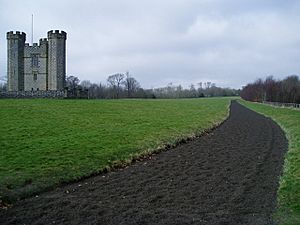Francis Hiorne facts for kids
Francis Hiorne FSA (1744 – 9 December 1789) was a talented architect and builder from Warwick, England. He designed many important buildings, especially churches, during the 1700s. His work helped shape the look of several towns and cities.
Contents
Who Was Francis Hiorne?
Francis Hiorne was born in 1744. His father, William Hiorne, was also a builder. This meant Francis grew up learning about construction and design. He followed in his father's footsteps, becoming a skilled architect himself.
In 1784, Francis Hiorne became a Fellow of the Society of Antiquaries. This was a special group dedicated to studying history and old buildings. Being a Fellow showed that he was respected for his knowledge of ancient structures and design.
Francis Hiorne's Amazing Buildings
Francis Hiorne designed many different buildings. He was especially known for his work on churches. An architect is someone who plans and designs buildings. They make sure buildings are safe, strong, and look good.
Here are some of the notable buildings Francis Hiorne worked on:
Churches Designed by Hiorne
- St Mary’s Church, Warwick (1769): Francis helped rebuild parts of this church. He designed new galleries inside.
- St Mary’s Church, Tetbury, Gloucestershire (1771–1781): This was a big project. He designed much of this beautiful church.
- St Anne’s Church, Belfast (1772–1776): He designed this church in Northern Ireland. It was later taken down around 1900. Today, St. Anne's Cathedral stands in its place.
- St Bartholomew’s Church, Tardebigge (1776–1777): Another church he designed in England.
- St Mary & St Giles Church, Stony Stratford (1777): He also worked on this church, giving it a unique look.
Other Notable Works
- Hiorne’s Tower, Arundel Castle (1789–1790): This impressive tower was named after him. It's part of the historic Arundel Castle.
- Rosemary Street Presbyterian Church, Belfast (1783): Francis Hiorne also helped with the design of this church. His ideas influenced its final appearance.
Francis Hiorne passed away in 1789. His buildings are still admired today. They show his skill and creativity as an architect from the 18th century.




